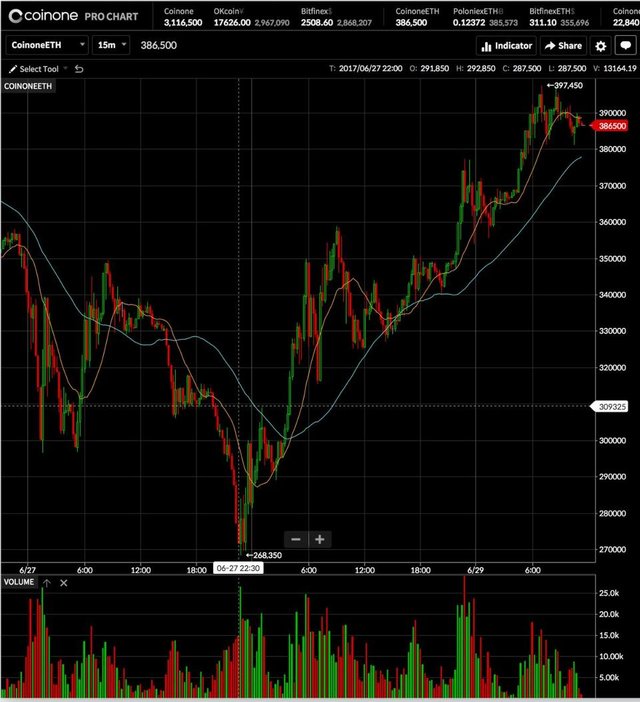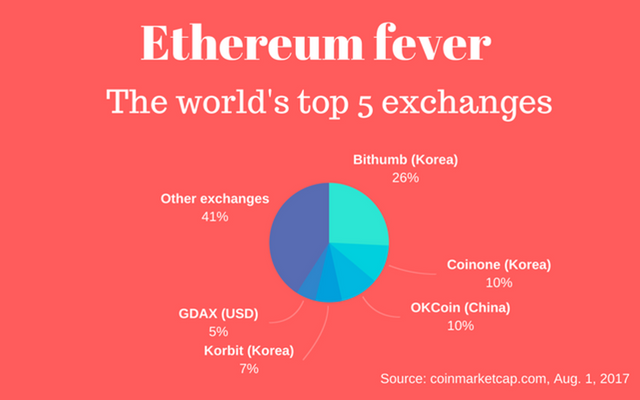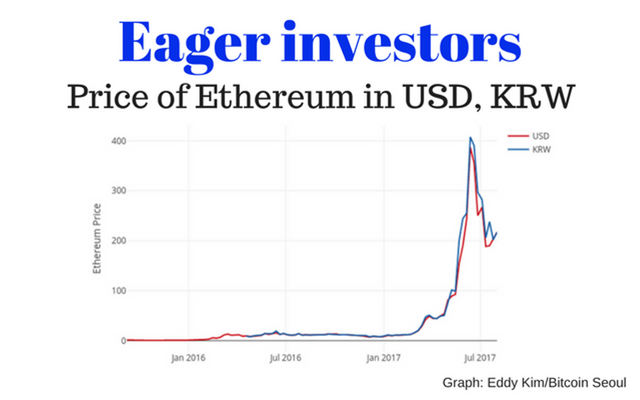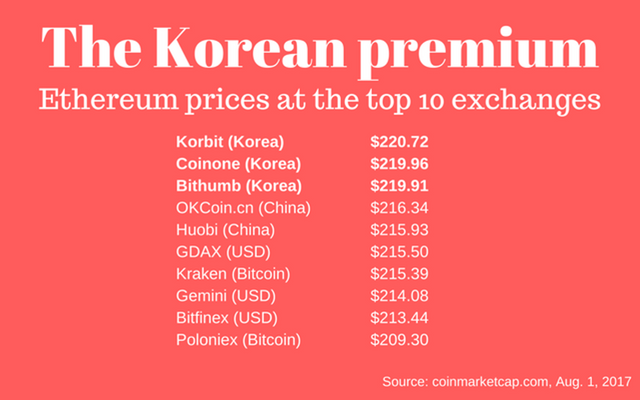Crazy For Cryptocurrency !!? Why South Koreans Are Risking It All On Ethereum !

“It’s not safe right now. I gotta tell everybody to get out of the market,” says Bobby Kim mid-interview as he frantically posts to his Twitter page and Naver Band chat rooms about the looming downturn of Bitcoin. As a trader and adviser on Bitcoin Seoul, he has seconds to warn his subscribers and followers to buy or sell. The market gets increasingly tricky to read when banks swoop in to buy big on the dip, he says. Later that day, July 25, the market dropped 10% before rebounding.
Investing in digital currencies is a 24-hour roller coaster, and South Koreans appear to be riding that thrill. Even the government and major banks are in on the action. The price of Bitcoin is skyrocketing due to a stronger demand from Asia, and South Korea is the third-largest market in the world.
“When things start going to the moon, Koreans buy more than everyone else. It’s a much more extreme fluctuation,” says Kim.

But Koreans have a particular taste for Ethereum, a fever that drove the digital coin’s price to a 30 percent premium in the country in June, local fintech experts say. Korea, home to three of the world’s top five exchange houses for Ethereum, pushes 35-40% of the coin’s global trade. Considering the other global top 10 exchanges use major currencies like dollar, Chinese yuan and Bitcoin, Ethereum trade through the Korean won -- a currency used by only 50 million people in the world -- could be the most concentrated per capita.

“People are crazed over it. Grandpas and grandmas come to our office lobby and say they want to put half a billion won ($447,000),” says Steve Lim, CSO of digital exchange startup Coinone. “We ask them how they heard about us, and they say, ‘I heard about you through a friend who invested a couple thousand and made a killing, and I want to do it too’ ... but they have no idea how to use the app or email.”
Elaine Ramirez , CONTRIBUTOR
Opinions expressed by Forbes Contributors are their own.
Play
Unmute
Current Time 0:16
/
Duration Time 0:30
Loaded: 0%Progress: 0%
Fullscreen
Shutterstock
“It’s not safe right now. I gotta tell everybody to get out of the market,” says Bobby Kim mid-interview as he frantically posts to his Twitter page and Naver Band chat rooms about the looming downturn of Bitcoin. As a trader and adviser on Bitcoin Seoul, he has seconds to warn his subscribers and followers to buy or sell. The market gets increasingly tricky to read when banks swoop in to buy big on the dip, he says. Later that day, July 25, the market dropped 10% before rebounding.
Investing in digital currencies is a 24-hour roller coaster, and South Koreans appear to be riding that thrill. Even the government and major banks are in on the action. The price of Bitcoin is skyrocketing due to a stronger demand from Asia, and South Korea is the third-largest market in the world.
“When things start going to the moon, Koreans buy more than everyone else. It’s a much more extreme fluctuation,” says Kim.
Coinone
Korea's volatile Ethereum market.
ADVERTISING
But Koreans have a particular taste for Ethereum, a fever that drove the digital coin’s price to a 30 percent premium in the country in June, local fintech experts say. Korea, home to three of the world’s top five exchange houses for Ethereum, pushes 35-40% of the coin’s global trade. Considering the other global top 10 exchanges use major currencies like dollar, Chinese yuan and Bitcoin, Ethereum trade through the Korean won -- a currency used by only 50 million people in the world -- could be the most concentrated per capita.
Elaine Ramirez
Three of the top five Ethereum exchanges are Korean. They account for nearly 40% of the world's trade.
“People are crazed over it. Grandpas and grandmas come to our office lobby and say they want to put half a billion won ($447,000),” says Steve Lim, CSO of digital exchange startup Coinone. “We ask them how they heard about us, and they say, ‘I heard about you through a friend who invested a couple thousand and made a killing, and I want to do it too’ ... but they have no idea how to use the app or email.”
A perfect storm
The fever over Bitcoin and Ethereum is a result of a perfect storm of conditions. Local investment options have been focused primarily on real estate and the domestic stock market, notes Lim. But both those markets are getting squeezed. Real estate has been overheating as prices and interest rates rise.
And the stock market just got a lot more cumbersome, notes Lee Seung-gun, president of the Korea Fintech Association and CEO of Viva Republica, which makes the popular payments app Toss. Since March, investing into derivatives like put options now requires hefty individual investor certification including 30 hours of training and 50 hours of simulated transactions, a turn-off for traders, he says. With such limited opportunities to flip a buck -- even most gambling is illegal -- the risk-takers are ready to pour hot money into the digital currency market.
“They looked into other assets with high volatility and Bitcoin was the perfect one,” Lee says. “So high-risk traders put their money into the Korean Bitcoin market and it went up like crazy. Once people saw that, they just poured their money in.” The appetite for Ethereum soon followed.

Why Ethereum?
But why Ethereum? According to Lim, Koreans watched Bitcoin gain momentum from afar in the U.S. in 2012, but the first Bitcoin exchange hub Korbit launched over a year later when the coin was already too pricey. With Ethereum, which launched in 2015 and found its upswing in the second quarter this year, they have been eager to get in on the ground level, he says. His company was the first to open an Ethereum exchange in Korea, and was an early mover globally to allow purchases straight from fiat currency rather than through other cryptocurrencies, adding to the local hype, Lim claims.

Plus, Vitalik Buterin, the founder of Ethereum, seemed to understand the value Koreans place in face-to-face relationships. He took pains to meet with Korea’s crypto currency enthusiasts, building necessary confidence and putting a face to the investment where Bitcoin -- whose architect is still unknown -- had none, Lim adds.
While Samsung SDS joining the Enterprise Ethereum Alliance threw more fuel to the fire, media hype over Ethereum since its debut may have tipped the scale.
“During the Ethereum boom, lots of Koreans bought it and luckily made a lot of money. That was a period when Ethereum jumped 300% in a couple days,” adds Kim. “The range of choice is narrow, so Ethereum was only coin that was moving. Influence of mass media was also great.”
Koreans are not only buying frequently -- they’re buying big, says Kim. “When I started buying Bitcoin [on a local exchange], I noticed a huge difference between the orders in the U.S. and Korea. In the U.S., they trade around $100 up to $5,000-$10,000 per trade. In Korea, these trade amounts are in $100,000 increments,” he said. He claims it reflects a huge interest from the upper class, namely children of family-owned "chaebol" conglomerates, investing their parents’ money.
“People with regular day jobs can’t have this kind of volume. It’s too huge.”
The fever continues -- even though the prices of Bitcoin and Ethereum in Korea regularly surpass those at other major exchanges. Kim believes the price difference could reach up to 60%.

Local experts attribute this to the limited supply of coins locally and a cumbersome market to arbitrage. Koreans would have to import coins from other exchanges, but legal restrictions on cross-border digital remittances, Korean exchanges’ caps on selling off coins in large volumes, and a sluggish process for sending large amounts of cash abroad made it impossible to take advantage of quickly selling cheap Bitcoin or Ethereum to the hungry Korean market, they say.
Buyer beware
Despite the fever, even experts in the field shy away from Ethereum. Kim doesn’t trust its technology, while Lee, the fintech association president, foresees a subprime crisis-like bubble due to too many uneducated investments. News emerged that Bithumb, Korea’s largest digital exchange and the world’s fourth largest, had its data systems compromised, affecting up to 30,000 customers.
Nor is Korea’s heated market buffered from the global markets’ volatile swings. I learned that the hard way after my small experimental investment in Ethereum nearly halved in the month since I bought it, thanks to a crash in late June.
Although politicians are pushing to regulate digital currencies to protect investors, regulators are still cautious about getting involved.
“There is no question that digital currency is not a legal currency,” the Financial Supervisory Commission said by email on July 28. “Bitcoin is a digital currency issued by and traded among private market participants. The central bank and financial institutions have no stake in issuance and trading of Bitcoin. Therefore, there is no regulation in progress relating to digital currency.”
But the push for more regulations is expected to stay strong in Korea. Korea has allowed fintech companies to use Bitcoin for wire transfers up to $3,000, while a revision to the Foreign Exchange Transactions Act has also eased the capital holding requirement for fintech companies to offer this service.
And now that the new President Moon Jae-in’s administration and financial regulation chief are in place, momentum for investment-friendly regulatory infrastructure is expected to snowball. That could only be good for the market.
Congratulations @kanggg! You have completed some achievement on Steemit and have been rewarded with new badge(s) :
Click on any badge to view your own Board of Honor on SteemitBoard.
For more information about SteemitBoard, click here
If you no longer want to receive notifications, reply to this comment with the word
STOP